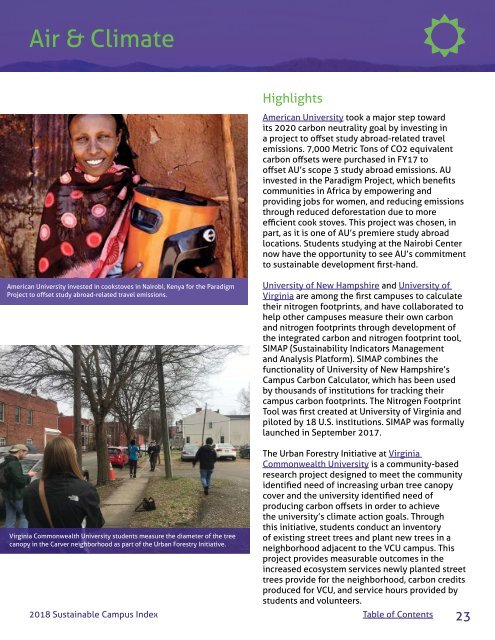SCI-2018
Create successful ePaper yourself
Turn your PDF publications into a flip-book with our unique Google optimized e-Paper software.
Air & Climate<br />
Highlights<br />
American University took a major step toward<br />
its 2020 carbon neutrality goal by investing in<br />
a project to offset study abroad-related travel<br />
emissions. 7,000 Metric Tons of CO2 equivalent<br />
carbon offsets were purchased in FY17 to<br />
offset AU’s scope 3 study abroad emissions. AU<br />
invested in the Paradigm Project, which benefits<br />
communities in Africa by empowering and<br />
providing jobs for women, and reducing emissions<br />
through reduced deforestation due to more<br />
efficient cook stoves. This project was chosen, in<br />
part, as it is one of AU’s premiere study abroad<br />
locations. Students studying at the Nairobi Center<br />
now have the opportunity to see AU’s commitment<br />
to sustainable development first-hand.<br />
American University invested in cookstoves in Nairobi, Kenya for the Paradigm<br />
Project to offset study abroad-related travel emissions.<br />
University of New Hampshire and University of<br />
Virginia are among the first campuses to calculate<br />
their nitrogen footprints, and have collaborated to<br />
help other campuses measure their own carbon<br />
and nitrogen footprints through development of<br />
the integrated carbon and nitrogen footprint tool,<br />
SIMAP (Sustainability Indicators Management<br />
and Analysis Platform). SIMAP combines the<br />
functionality of University of New Hampshire’s<br />
Campus Carbon Calculator, which has been used<br />
by thousands of institutions for tracking their<br />
campus carbon footprints. The Nitrogen Footprint<br />
Tool was first created at University of Virginia and<br />
piloted by 18 U.S. institutions. SIMAP was formally<br />
launched in September 2017.<br />
Virginia Commonwealth University students measure the diameter of the tree<br />
canopy in the Carver neighborhood as part of the Urban Forestry Initiative.<br />
The Urban Forestry Initiative at Virginia<br />
Commonwealth University is a community-based<br />
research project designed to meet the community<br />
identified need of increasing urban tree canopy<br />
cover and the university identified need of<br />
producing carbon offsets in order to achieve<br />
the university’s climate action goals. Through<br />
this initiative, students conduct an inventory<br />
of existing street trees and plant new trees in a<br />
neighborhood adjacent to the VCU campus. This<br />
project provides measurable outcomes in the<br />
increased ecosystem services newly planted street<br />
trees provide for the neighborhood, carbon credits<br />
produced for VCU, and service hours provided by<br />
students and volunteers.<br />
<strong>2018</strong> Sustainable Campus Index Table of Contents<br />
23


